So much for the “sanctity” of New Jersey’s “purest waters”:
We as a legislature have consistently supported the sanctity of buffers for our C1 streams. These are the purest waters we have in the State of NJ. ~~~ Bob Smith, Senate Environmental Committee Chairman (6/16/16 – vote to pass SCR 66).
Despite strong public commitments by Senate Environment Committee Chair Bob Smith and Senator Ray Lesniak to veto the Christie DEP rule at a Statehouse rally with environmentalists in June, Senate President Sweeney cut another political deal with the Christie administration to avoid a Legislative veto of Governor Christie’s DEP’s rules that rolled back protections and allow more development closer to NJ’s “exceptional value” “Category One” (C1) streams.
This most recent dirty deal is a huge sellout and will lead to more development along high quality streams and rivers, leading to more water pollution, more flooding, and more loss of some of the most ecologically valuable habitat. Period.
Even the Star Ledger Editorial Board – twice – urged Sweeney to veto the rules, see:
Will Sweeney protect our clean water from Christie’s bulldozers?
Sweeney’s rationale for the delay is that he’s trying to find a middle ground. He says he plans to meet with the head of the state Department of Environmental Protection to work out a compromise. “You have my commitment,” he said this week. “If we can’t fix this, on Aug. 1, we’ll pass it.”
From clean water rules to school funding, enough of Christie’s secrecy
So, enough. Not only should Sweeney stand up to the governor on stream and river protections, the Legislature should pass a similar resolution that overturns the rule changes on sewers and septic tanks, too. Christie officials shouldn’t get to conduct their policy negotiations behind closed doors. Time for a Legislative veto.
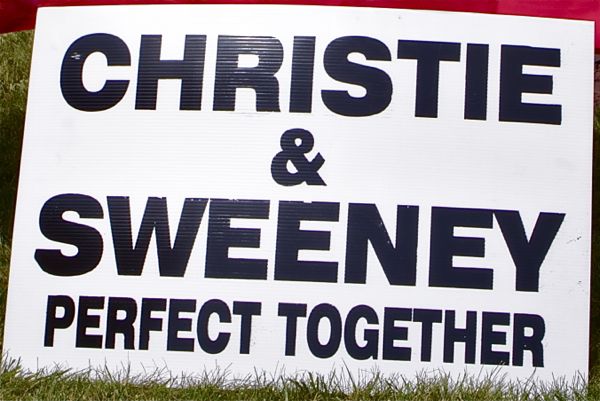
The deal represents exactly the political Kabuki I warned about back in March:
The public and the [Senate Environment] Committee will be drowned in the weeds of a lengthy adoption – response to public comments document on the original proposal along with an entirely new and complex re-proposal document. This is a formula for political manipulation. It will take weeks to decipher the documents. Meanwhile, by the time the dust settles, the original proposal will be adopted into law and the Veto Resolution will have withered on the vine (faded into the budget debate) and the Legislature adjourned for the summer.
Senate President Sweeney has long opposed the C1 buffer program because he listens to the builders lobby – Back in 2007, then Senator Sweeney joined then Republican Senate President Bob Littell in attacking the C1 stream buffer program. Here is the Sweeney & Littel comment:
404. COMMENT: The proposed Category One designations would appear to be more about curbing development than enhancing water quality standards. Unfortunately, this new regulatory proposal tips the balance even more against the economic prosperity of the areas, district 24 and 3. (127, 221) (source: DEP regulatory document)
The cover story for Sweeney’s political deal is an Administrative Order issued by DEP Commissioner Martin. Shamefully, Sweeney obviously coerced Senator Smith and made it appear that Smith is responsible for it.
[Back on May 25, I predicted exactly this:
I strongly suspect that these “improvements” [in the “concurrent proposal”] are the political deal that bought off a large segment of the conservation community opposition and that will provide political cover for the Legislature’s abandonment of the veto, so it is important that I expose that lie.
Senator Smith must have had Sweeney’s gun pointed to his head. He should have resigned. As I wrote:
It is totally inappropriate [for Sweeney] to negotiate back room political compromises on regulatory protections (for an example of exactly how Sweeney abuses the process, see: “Political Pressure On DEP: How The Game Is Played”).
Talk about the blind leading the blind! (and Sweeney is expressing no confidence in Senate Environmental Committee Chairman Bob Smith, who has rigorously, openly, and fairly considered the DEP proposal and listened to hours of public testimony.)
If anyone took time to read the Administrative Order, they would see that DEP admits that they are weakening existing restrictions on development in the buffers. Here it is, hidden in plain sight:
In case it’s not clear, let me repeat: the former rules (7:8-5.5(h), which were repealed) “limited or prohibited disturbance” within the 300 foot buffer – i.e. disturbance was limited in the 150 foot outer buffer and prohibited in the inner 150 foot buffer. But it was “allowed” under the stream encroachment rules.
The Martin Order is blatantly illegal – it seeks to enforce proposed new requirements in the “concurrent proposal” in existing permits on a case-by-case basis before that proposal is adopted.
DEP can not impose enforceable substantive regulatory requirements via Administrative Order. They must be adopted via rulemaking procedures, under very clear black letter law, court decisions, and fundamental doctrines of administrative and Constitutional law. It’s called “due process”.
[Amazingly, the Order was signed on July 22 – on that same day, DEP held a public hearing on the “concurrent proposal“! The public process on the current proposal is meaningless, because the Order says DEP should begin enforcing the provisions of the proposal on a case-by-case basis. Sounds like lawsuit time to me.]
Even if the Order were enforceable – which it’s not – the provisions – taken from the “concurrent proposal” – still allow development inside the 150 buffer of C1 streams. That was supposed to be Smith’s bottom line and strongest reason for finding the DEP rule inconsistent with legislative intent. For details on that, and flaws in the “concurrent proposal” see:
- Christie DEP’s “Concurrent Proposal” to “Fix” Flood Hazard Rules to Avoid Legislative Veto Is A Sham
If DEP were serious in trying to avoid a “takings” challenge to the prior “prohibition” in the storm water rules and absolutely minimize buffer disturbance, they would have put the strict takings “hardship waver” from the Highlands rules (NJAC 7:38-6.8) in the “concurrent proposal” and Order. Instead, DEP made the previous “hardship waiver” in the stream encroachment program EASIER to get.
The Administrative Order actually makes the status quo WORSE:
1. The Order claims that NJ DEP’s “best management practices” satisfy ALL water quality compliance obligations under the federal Clean Water Act. That is a false and dangerous statement that EPA would never sign off on. But, because EPA has no review authority over State DEP Orders, they won’t weigh in on the issue.
[keep in mind that DEP’s claim that BMP’s meet Clean Water Act water quality requirements means that pipeline companies now have a guarantee of stream encroachment permit approval. It remains to be seen if DEP will attempt to claim that BMP’s satisfy all freshwater wetlands permit and Section 401 Water Quality Certificate requirements under the Clean Water Act. This debate will flesh out the provision in Section 1.c of of the order that regulated activity “complies with the applicable water quality standards”.]
[Update – it is interesting to note that the Order, which is not enforceable, includes the compliance with water quality standards language, but that same language was NOT included in the concurrent proposal, which would be enforceable on adoption. I previously called DEP out on this – in testimony on June 16 before the Senate and in a post here – and used that as evidence that DEP was not serious and misleading the public. I wrote the following:
the DEP [concurrent proposal] summary falsely claims that the stream encroachment permits are linked to compliance with surface water quality standards, “similar to” the wetlands regulations:
“These requirements are similar to the requirements at N.J.A.C. 7:7A-7.2(b) for the issuance of a freshwater wetlands or open water fill individual permit, with amendments to reflect that the proposed subsection is only applicable to riparian zones to a Category One water, making some of the considerations applicable in the freshwater wetlands context not applicable under this subsection, and are intended to ensure that activities within 150 feet of a Category One water or regulated tributary to a Category One water are only conducted when there is no alternative to the activity and that the activity will not lead to the violation of State water quality standards and laws or otherwise have significant adverse environmental consequences.”
The wetlands regulation (NJAC 7:7A-7.2(b)) that DEP claims the CP is “similar to” explicitly requires that wetlands permits:
“5. Will not cause or contribute to a violation of any applicable State water quality standard;”
But the actual text of the CP rule does not include this language from the wetlands rules. While other provisions from the wetlands rules were included in the CP, this critical language was not.
The CP does not require compliance with State water quality standards or include this “cause or contribute to” language from the wetlands rule
After the Senate hearing, I spoke with DEP Assistant Commissioner Kopkash who told me that this issue was discussed internally, and the DAG Epply rejected the language as “unnecessary”.
I then explained to KopKash that this involves the DEP regulatory jurisdiction over non-point source pollution in terms of application an enforcement of the water quality standards, and that it is a huge issue that Epply and I had debated for many years while I was at DEP – I lost those debates. ~~~ end update]
2. The Order claims that NJ State Flood Hazard Act “riparian zone” requirements satisfy all federal Clean Water Act water quality requirements – again that is false.
Examples: EPA would never sign off on a broad statewide claim that DEP could allow a FHA permitted riparian zone disturbance to destroy an “existing use” (e.g. wood turtle) of aquatic dependent life. DEP already enforced the wood turtle existing use issue in the the Milligan Farms Pulte Home case. EPA also would not issue a blanket approval DEP to issue a FHA permit that lowered water quality without conducting a site specific antidegradation review.
Shamefully, now that he cut the dirty deal, Sweeney is running for cover and running away from it.
Sweeney made Senator Smith take the heat for the deal he forced.
According to the NJ Spotlight story, Smith supported the deal:
“What we were trying to achieve with a legal and constitutional challenge has now been achieved through negotiation,’’ Smith said. He argued, in a press release by partisan staff, that the changes to the regulations and the administrative order signed by the DEP commissioner are “equal to the protections that were in place before the rule changes were made.’’
But Tom Johnson, a veteran reporter, knew that was bullshit and noted the release was issued “by partisan staff” – that’s code for Senate Democrats, or Sweeney.
We are not fooled by the bullshit either and will hold Sweeney accountable.
Let’s hope that certain Senators can grow a spine and sustain a veto the DEP Highlands septic density standards rollback.

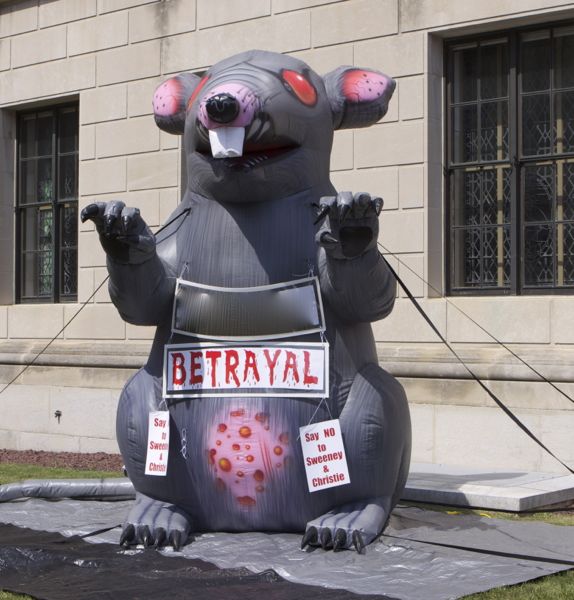
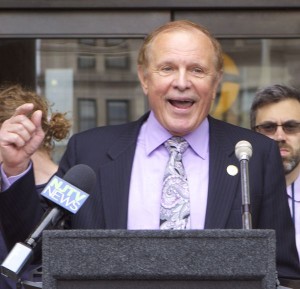

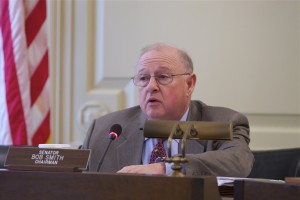
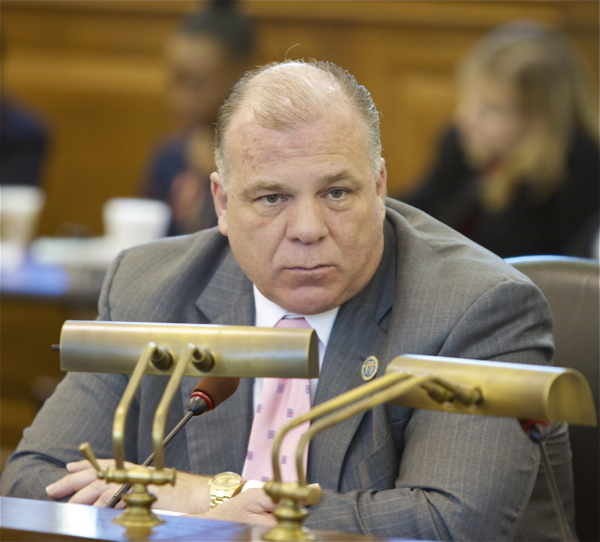
Pingback: WolfeNotes.com » EPA Asked To Review Christie DEP Order for Compliance With the Clean Water Act
Pingback: WolfeNotes.com » Why Christie DEP Commissioner Martin Shut Down The Drinking Water Quality Institute
Pingback: WolfeNotes.com » Developing A Strategy To Move A Climate And Green Jobs Agenda
Pingback: WolfeNotes.com » Christie DEP Set To Issue Controversial Compressor Station and Pinelands Pipeline Permits
Pingback: WolfeNotes.com » Stories and Photos From 2016 – Part 1 (of 4)
Pingback: WolfeNotes.com » Why Is Legislative Veto of Christie DEP Rollback of Highlands Clean Water Rule Stalled In The Senate?
Pingback: WolfeNotes.com » Christie DEP Approves Another Pipeline Through Pinelands
Pingback: WolfeNotes.com » Senator Sweeney’s Block On The Confirmation of Gov. Murphy’s DEP Commissioner Prolongs Gov. Christie’s Anti-Environmental Policy
Pingback: WolfeNotes.com » Murphy Acting DEP Commissioner McCabe Senate Confirmation Hearing A Deep Disappointment
Pingback: WolfeNotes.com » Murphy DEP McCabe Pledges To Re-Propose Christie Highlands Rollback Septic Rule
Pingback: WolfeNotes.com » What Explains NJ Senate Delay In Confirming Murphy’s Acting DEP Commissioner McCabe?
Pingback: WolfeNotes.com » Murphy DEP Commissioner “Candide” McCabe Effectively Praises Christie Administration Policy and Management Of DEP
Pingback: WolfeNotes.com » Senate Asked To Review Murphy DEP Embrace of Christie Stream Buffer Rollback
Pingback: WolfeNotes.com » Someone Please Tell The Activists and Media That Congress Can Block Trump Regulatory Rollbacks
Pingback: WolfeNotes.com » NJ Environmental Leaders Are Incoherent And Incompetent
Pingback: WolfeNotes.com » Murphy DEP Admits That Pipeline Construction Regulations And DEP Oversight Are Lax
Pingback: WolfeNotes.com » Murphy DEP Readopts Christie DEP Rollbacks Of State Flood Hazard Regulations
Pingback: WolfeNotes.com » Is DEP’s Environmental Justice Advisory Council On A Wild-Goose Chase?